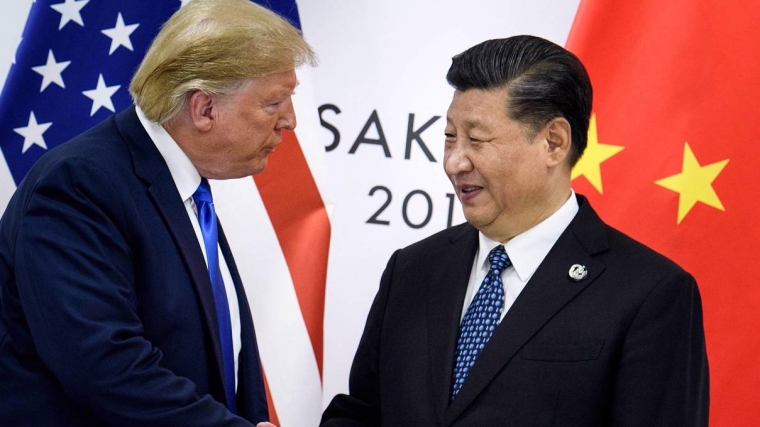
As Graham Allison of Harvard University has warned, “when a rising power like Athens, or China, threatens to displace a ruling power like Sparta, which had been the dominant power in Greece for a hundred years, or the US, basically alarm bells should sound.” Nowadays, the alarm bells are sounding so loud that they are drowning out ideas that would allow the United States and China to escape what Allison called the “Thucydides Trap.”
There are three paths forward: one may be a dead end, another will lead to ruin, and the third could bring about a global recovery. The first path runs in the direction of what British historian Niall Ferguson has deemed the “Chimerica” model: a marriage of the Chinese and US economies. This perspective acknowledges the reality of the twenty-first-century economy, which is deeply integrated through global value chains.
But the Chimerica model may no longer be feasible, owing to the economic imbalances that it has spawned. Given the widespread backlash against globalization and China, particularly in the United States, it is increasingly unlikely that a process of deepening Sino-American integration can be revived. If anything, a broad-based “decoupling” is already underway.
The second path would lead to a more adversarial arrangement, with China and America each seeking to weaken the other. This could happen passively: one power might watch with folded arms as the other experiences difficulties. Or one or both sides could actively encourage domestic upheavals against the other, or even engage in outright sabotage. It should go without saying that choosing this route would be not only immoral but dangerous. No responsible politician should advocate such a ruinous race to the bottom.
The third path leads toward restored mutual trust, by focusing on common interests and fighting common enemies. Returning to Allison’s historical paradigm, it is worth remembering that while Sparta emerged as the winner of the Peloponnesian War, it nonetheless suffered a subsequent decline, opening the way for the peripheral Greek kingdom of Macedon to rise to power under Philip II.
In today’s case, once China determined that COVID-19 was a serious threat, it made huge sacrifices to contain the virus, thereby creating a window of opportunity for the US and the rest of the world to start preparing. Having flattened the contagion curve within its own borders, China is now demonstrating global solidarity by sending medical professionals and equipment to other countries in need.
Rather than recognizing China’s decisiveness and thanking it for its help, the US has doubled down on disparaging the country. As Malaysian economist Andrew Sheng has observed, “Anything that China does that is supposed to be good will be treated as a conspiracy for China to grab power. China in the eyes of the West cannot do anything right.” This predisposition is most unfortunate: the history of which Graham reminds us should not be forgotten, especially when it is repeating itself.
It doesn’t have to be this way. Starting today, China and the US could begin to rebuild their relationship through bilateral and jointly led global initiatives to stem the COVID-19 pandemic and put the global economy back on a sustainable growth path.
Although Sino-American relations have been strained for some time now, the two countries have a history of coming together to fight common enemies. After the September 11, 2001, terrorist attacks against the US, China and America worked side by side to counter the threat posed by al-Qaeda and its ilk. Then, after the 2008 financial crisis, they came together again to pull the world back from the brink of global depression. And in 2014, China and the US signed a deal that paved the way for the Paris climate agreement.
As a global crisis, the COVID-19 pandemic also should be treated as a common enemy. Viruses, after all, neither respect political borders nor have any ethnicity or nationality. No country acting on its own can win the war against this one. For now, at least, our common interest in defeating COVID-19 far outweighs our differences. By demanding that China and the US take the third path, the COVID-19 crisis has offered a way out of the Thucydides Trap.
To be sure, any two large countries with histories as rich and varied as those of China and the US are bound to have their differences. In recent years, those differences have accentuated tensions in China-US relations. But there is no denying that both countries have the same core interests in combating global challenges like the COVID-19 pandemic, climate change, financial instability, and any number of other common enemies that may emerge in the future.
Unlike China and the US, emerging markets and developing countries lack the wherewithal to protect themselves from the new pandemic threat. Together, China and the US should offer bold proposals for more financing through a new issue of the IMF’s global reserve currency, Special Drawing Rights, as well as debt relief for poorer countries. Only then will struggling governments have the fiscal space to combat the pandemic and then restart their economies. If the virus and the economic crisis are still present anywhere, they will pose a risk everywhere, including China and the US.
Yu Yongding, a former president of the China Society of World Economics and director of the Institute of World Economics and Politics at the Chinese Academy of Social Sciences, served on the Monetary Policy Committee of the People’s Bank of China from 2004 to 2006. Kevin P. Gallagher is Professor of Global Development Policy at Boston University’s Frederick S. Pardee School of Global Studies. Copyright: Project Syndicate, 2020, and published here with permission.
9 Comments
If china was genuine in looking at the third option it should start by cooperating with an investigation into virus origins not threatening boycotts on countries for proposing such an investigation. Secondly stop using the virus as a smokescreen to up its aggressiveness in the south china sea . Actions speak louder than words and so far chinas actions speak volumes about its intentions and they are neither peaceful or helpful.
China , secretive at best , is already using this Chinese virus mess wholly to its advantage .
Massive crack down in Hong Kong 2 days ago Sunday did not even get reported in Western Media
Heard anything in Western media about Uygurs in the past 6 weeks ?
China send fleet into disputer waters
Much publicity about China sending PPE masks to Africa , when the US has sent just about everything else it needs
China stockpiling crude oil after demand collapses due to Covid
China cannot be trusted by anyone , and this is nothing new .Those of us old enough to remember the terrorist wars they started in Africa and South East Asia in the 1970's know only too well
Also the CCP were the ones who started the virus blame game. It was all over there state controlled media that the virus was a US black ops planted in China, way before any question over CCP's role in the spread of the virus was mentioned.
Taiwan had the most to teach. during the early stages of the virus. Not China. And why couldn't we benefit from Taiwan's stance? Oh yes. Because CCP had strong armed Taiwan out of the WHO and made relationships with Taiwan a point of blackmail.
If the CCP is such a cuddly benign panda why does it not allow its citizens to vote? Why did Xi become President for life? Why Tibet? Why Taiwan? Why Hong Kong? Why intellectual theft?
The West assumed that in supporting China to join the worlds financial global markets, as it became more wealthy, it would develop into a liberal democratic nation that played by the rules that other nations play by. It did not. There is no point in this author or any other hypothesising what might happen regarding the CCP if they are maintaining a make believe construct about who the CCP are. Perhaps we can achieve options 1 or 3 but only on the basis of accepting how the CCP really behave and letting go of the fantasy of them becoming like us. Acknowledge who the CCP really are, the way they really behave and then work on trade strategies and negotiations accordingly.
Well Nixon started it. The strategy was to put the USSR off balance and to a degree that worked. There was tension on the borders & then the dismantling of Mao the staunch Muscovite, another wedge. Trouble is Reagan’s subsequent globalisation landed all the greedies into China’s lap, oh yes indeedy. Does anybody remember that cringey visit by President Bush senior to oil the wheels where he threw up at dinner?

We welcome your comments below. If you are not already registered, please register to comment.
Remember we welcome robust, respectful and insightful debate. We don't welcome abusive or defamatory comments and will de-register those repeatedly making such comments. Our current comment policy is here.